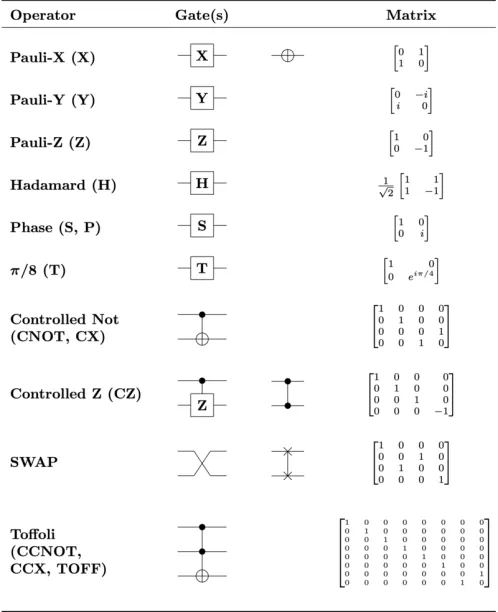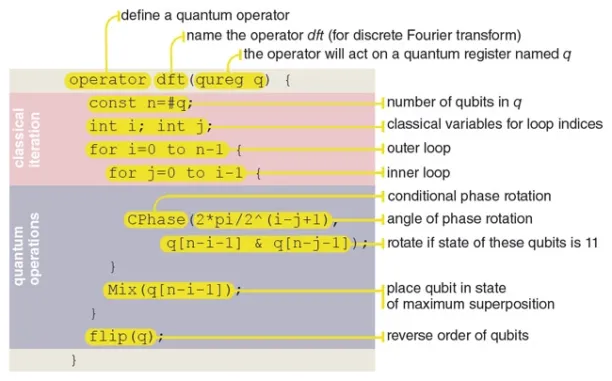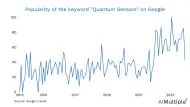Quantum Programming: Languages, SDKs & Algorithms in 2024
Quantum computers are expected to reduce power consumption from 100 to 1000 times because they operate at very low temperature at which the processor would work as a superconductor (i.e. it can conduct electricity with virtually no resistance). On the other hand, quantum computers could accelerate machine learning processes, reducing thousands of years of learning to mere seconds.
Quantum computers are based on quantum bits (Qubits) which have two possible values 0 or 1. They do not obey Newtonian laws but quantum laws allowing them to have the probability of being 0 and 1 at the same time. Confused yet? Then head to our article which explains what quantum computing is and how it works.
Due to the potential of quantum computers (QC), tech giants like Google and IBM are giving the opportunity to users who do not have QCs to learn how to program and manipulate quantum circuits using different quantum programming languages:
Quantum programming languages
Quantum programming languages are the foundations to interpret ideas into instructions to be carried out by a quantum computer. According to Nature Reviews, quantum programming languages are used to:
- manage existing physical devices
- predict quantum algorithms’ execution costs on possible devices
- examine quantum computing concepts (qubits, superposition, entanglement)
- test and verify quantum algorithms and their implementations
Current quantum programming languages and compilers are mainly focused on optimizing low-level circuits consisting of quantum gates. Quantum gates are the building blocks of quantum circuits. They are similar to reversible logic gates such as Fredkin gate, Toffoli gate, interaction gate, and switch gate. However, the smallest classical reversible gate has to use three bits, whereas the smallest quantum gate needs to use only two bits.

Most quantum programming is done in 3 types of languages:
Imperative quantum programming languages

Imperative programming languages consist of step-by-step instructions to be performed in order to accomplish the desired result. In classical computers imperative languages include C, JavaScript, Pascal, Python, etc. The most popular quantum imperative languages are:
- QCL: Quantum Computing Language, one of the first implemented quantum programming languages. It resembles C language in regards of syntax and data types.
- QMASM: Quantum Macro Assembler, published in 2016. It is a low-level language specific to quantum annealing. The significance of QMASM is that it relieves the programmer from having to know system-specific hardware details while still allowing programs to be expressed at a low level of abstraction.
- Silq is originally published in 2020. Silq is a high-level programming language written in D language which has 482 stars and 10 contributors on github and is regularly updated as of 2021.
Other imperative Q languages include Quantum pseudocode, Q|SI>, Q language, qGCL, and Scaffold.
Functional quantum programming languages

Functional languages don’t rely on step-by-step instructions, instead they depend on mathematical functions which means inputs are converted into output using mathematical transformations. Functional languages are less popular than imperative ones because they don’t support flow controls (e.g. loop statements) or conditionals (e.g. if/else statements). However, due to these features, they benefit from:
- Fewer bugs
- Programmers writing and reviewing a functional code claim to spot errors more easily because there are fewer places for surprising behavior to hide
- Functional errors are reported to be easier to fix
- Nested functions
- Lazy evaluation:
- delays the evaluation of an expression until its value is needed
- avoids repeated evaluations
Top functional languages for quantum computers are:
- QML: published in 2007, a Haskell-like quantum programming language based on strict linear logic. It can integrate reversible and irreversible quantum computations
- Quantum Lambda Calculus: it is based on classical lambda calculus introduced in 1930 and was first defined for quantum calculations in 1996. It uses high-order functions (λx.x^3) Therefore, it is stronger than the standard quantum computational models, such as quantum Turing machine or the quantum circuit model.
- QFC and QPL: Semantically QFC and QPL are equivalent. However, in QFC, quantum programs are represented using flowchart syntax, but in QPL syntactic structure of quantum programs are represented using textual representations.
Other functional languages include LIQUi|> and Quipper.
Multi-paradigm languages
There are also multi-paradigm languages that are domain-specific such as Q# for Microsoft and Strawberry Fields for XanduAI.
Quantum software development kits
Whether the developer uses imperative, functional, or multi-paradigm languages to write the quantum algorithm, a quantum software is required to create and manipulate the quantum program, and SDKs are required to run quantum circuits on prototype quantum devices, as well as on simulators. These software environments for quantum programs are usually open source and utilize python language.
For more details on quantum SDKs, feel free to read our article Quantum Software Development Kits
Quantum programming algorithms
The purpose of programming quantum computers is to solve quantum physics’ problems. Quantum algorithms that can be programmed include:
- Algebra and number theory algorithms, such as factoring and Gauss sums
- Approximations and simulations, such as quantum simulation, zeta functions, and knot invariants
- Machine learning algorithms, such as clustering, binary classification, and training neural networks
More quantum algorithms that can be programmed are mentioned in the “Quantum Algorithm Zoo” by Stephen Jordan of the National Institutes of Standards and Technology.
Challenges in quantum programming
The difficulties in quantum computer programming arise from:
- Difficulties in formulating universal QC languages
- Incompleteness and hidden variables in quantum mechanics
- Quantum computers are still in their infancy working on <100 Qubits, therefore, not strong enough to run complex quantum algorithms.
However, the availability of open source SDKs is allowing communities to find solutions for programming challenges and find more practical applications for quantum computing.
For more on quantum computing
To read about quantum computing applications, feel free to read Top 20+ Quantum Computing Applications / Use Cases
You might also find the following articles useful:
Finally, you might want to check our top quantum computing companies list.

Cem has been the principal analyst at AIMultiple since 2017. AIMultiple informs hundreds of thousands of businesses (as per similarWeb) including 60% of Fortune 500 every month.
Cem's work has been cited by leading global publications including Business Insider, Forbes, Washington Post, global firms like Deloitte, HPE, NGOs like World Economic Forum and supranational organizations like European Commission. You can see more reputable companies and media that referenced AIMultiple.
Throughout his career, Cem served as a tech consultant, tech buyer and tech entrepreneur. He advised businesses on their enterprise software, automation, cloud, AI / ML and other technology related decisions at McKinsey & Company and Altman Solon for more than a decade. He also published a McKinsey report on digitalization.
He led technology strategy and procurement of a telco while reporting to the CEO. He has also led commercial growth of deep tech company Hypatos that reached a 7 digit annual recurring revenue and a 9 digit valuation from 0 within 2 years. Cem's work in Hypatos was covered by leading technology publications like TechCrunch and Business Insider.
Cem regularly speaks at international technology conferences. He graduated from Bogazici University as a computer engineer and holds an MBA from Columbia Business School.
To stay up-to-date on B2B tech & accelerate your enterprise:
Follow onNext to Read
Quantum Software Development Kits in 2024
Quantum Entanglement: What is it & Why is it Important in 2024?
State of Quantum Computing in 2024 for Business Leaders
Hopefuly quantum computing wil be useble for radio communication ASML is the first to make the first one chip quantum computer
Informative.
Keep up the good work!
Thanks for the breakdown of the ecosystem of languages out there! This is the first place I have been able to find a list of languages outside of Wikipedia and it is awesome.
I am curious if there any companies that might be using these languages to build software applications/ have built applications using these languages.


Comments
Your email address will not be published. All fields are required.